In 1955, Rosa Parks became the poster child the segregated South did not want. Her arrest for refusing to give up her bus seat to a white man triggered the 13-month Montgomery Alabama bus strike that energized demands for civil rights and garnered national attention to Jim Crow laws and the violence effectuating segregation like the lynching later that year of 14-year old Emmett Till.
In 1955, Nat “King” Cole reigned as Capital Records’ top record seller, with the record company’s circular headquarters being built that year aptly dubbed “the house that Nat built.” Cole appeared to have broken the color barrier with his records, movie roles, and regular appearances on network television. The following year NBC launched the ground-breaking Nat King Cole Show with the first African American host of a major network program.
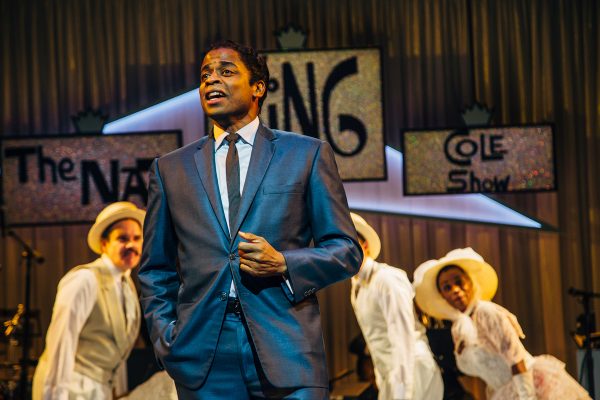
The effort survived a year with local sponsors, but could not attract a national sponsor. The last Nat King Cole Show aired December 1957, the same year President Dwight Eisenhower sent federal troops to Little Rock, Arkansas to escort African American children integrating a segregated school.
Despite Cole’s innate elegance, dignity and eggshell walking efforts such as always having space or stools separating Cole from white women guests, the needed national advertisers stayed away, fearful of offending the South which could not accept an African American in a leadership role, even when it was Nat King Cole hosting a television variety show.

That last broadcast is the setting of Lights Out: Nat “King” Cole, a new musical playing at the Geffen Theater that juxtaposes Cole’s personal achievements and struggles with the political and cultural tidal forces roiling the mid-1950s.
Many Cole hits receive their due, but tap dance receives a special, if unexpected spotlight when Dulé Hill (West Wing, Stick Fly, Bring in ‘da Noise Bring in ‘da Funk), as the famously non-dancing Nat King Cole, is drawn into a tap dance by Daniel J. Watts (Hamilton, Memphis) as Sammy Davis Jr.
The tap sequence was choreographed by Jared Grimes, who took time in between final rehearsals to talk about his involvement and the significance of the tap sequence within the show.
Q: How and when did you get involved with the show?
JG: I jumped in early when the show was in Philadelphia. Daniel and Dulé are pretty much family. We’ve been cool for a long time. They were still developing the show, said there was to be some tap, and asked if I was interested. I was running back and forth between doing a movie in Korea and a project with Kenny Leon in Atlanta. I agreed to stop when I came back from Korea and before going to Atlanta. That’s how I ended up providing the foot power for the show.
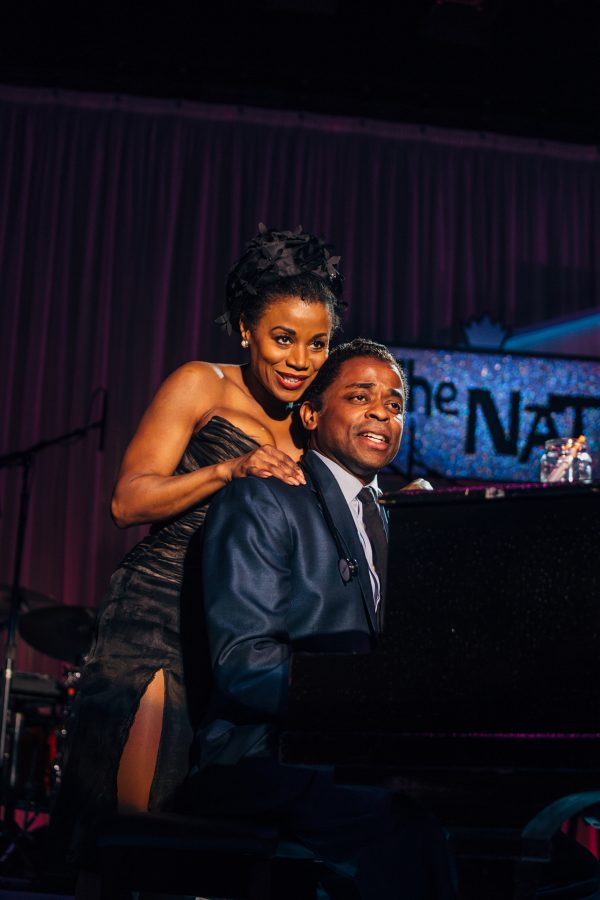
Q: Edgar Godineaux is listed as the choreographer and you are listed as tap choreography and extra choreography. Why are there two choreographers?
JG: Edgar is a great choreographer, but sometimes he wasn’t there when I was and the director wanted something extra that I added. But really, outside of the tap, that is all Edgar’s doing. All of the tap choreography, that’s mine.
Q: What is that tap sequence about? Why is Sammy Davis Jr. trying to persuade Nat King Cole to tap dance?
JG: Sammy is the narrator of the show and was a close friend of Nat’s, but they were very different people. Sammy is trying to persuade Nat to release his inner truth. It’s not a tap production number as much as a struggle with Sammy pulling to get Nat to be who he really is. This is set at the last broadcast of the show. The civil rights movement rising and the South pushing back; the network not wanting to ruffle feathers, all swirling around the final broadcast. Nat is trying to run away from the truth, but Sammy is not allowing him to do so.”

Q: What is the truth Nat is trying to run from?
JG: Nat was the first to achieve so much. No question he made a lot of sacrifices to get there but once in that position, others with the same skin tone were waiting for him to say something, to make change, to stand up for the bigger picture and risk crossing the line for the greater good, to stop playing the game and start speaking up for a bigger cause.
Q: Was it important that moment be a tap sequence?
JG: If you go back to Africa in earliest of times, drumming rhythm and foot pounding musicianship was the means to activate what Africans call “ground gods.” In the earliest of times for Africans their gods were coming from the ground, not hanging out in the sky. The drumming and foot pounding was how people went about raising the gods. That’s what Sammy is trying to get Nat to do; he wants Nat to speak to the ground. Sammy was going through a lot of the same struggles, but once Sammy gets Nat to go there, Nat is in a different world. Sammy gets Nat to be who he was born to be for his people.
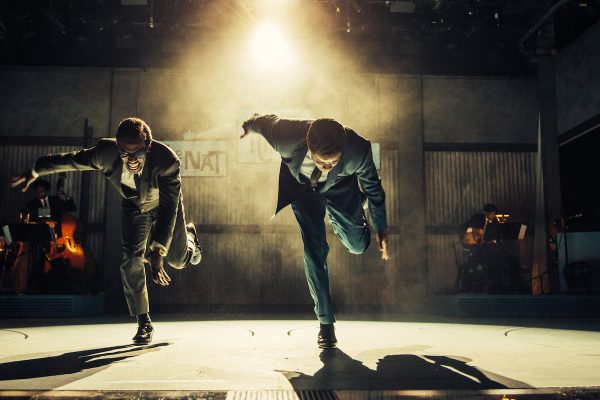
Q: What has surprised you about the show?
JG: How many messages are being relayed to the audience from the material. It’s extremely rich in change and perspective. It paints a picture of what was happening when Nat was on top of the world, well seemed to be, but really not. It’s the story of African Americans in that time trying to advance, a detailed depiction of how things were and the different struggles.
Q: Nat King Cole died in 1965. Some people today know him best as the other voice with daughter Natalie Cole on the song “Unforgettable” or know Sammy Davis Jr. only from the “rat pack” movies. What would you like them to know?
JG: Nat broke the ceiling for African Americans to be on network TV as a host with dignity and integrity, not as someone having to shuck and jive to maintain an audience. It’s important to see what he went through to maintain that and his struggle as things changed around him.
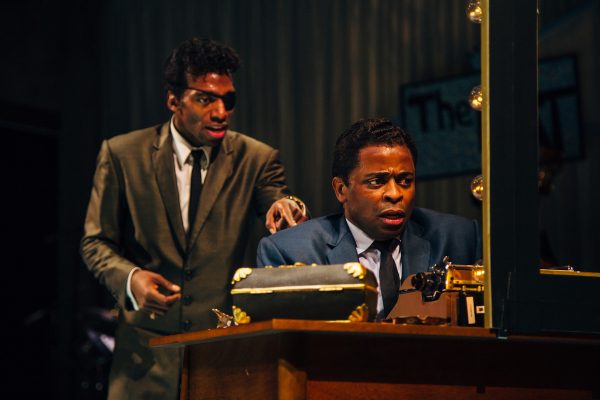
Q: You act, sing, tap dance, and also hip hop. Do you think the kind of energy tap traditionally brought to musicals has been replaced by hip hop in recent years?
JG: In commercial dance, the media has created the appeal for hip hop which is easier to attain proficiency in than with tap dance. Anything shoved in front of people’s faces feeds a sense that is what they want to do. In the 30’s and 40’s tap was the hip hop of the time. These things run in cycles and I think tap is always due to come back. I have projects involving hip hop, but other projects I see restoring the love of tap and what tap means to show business.
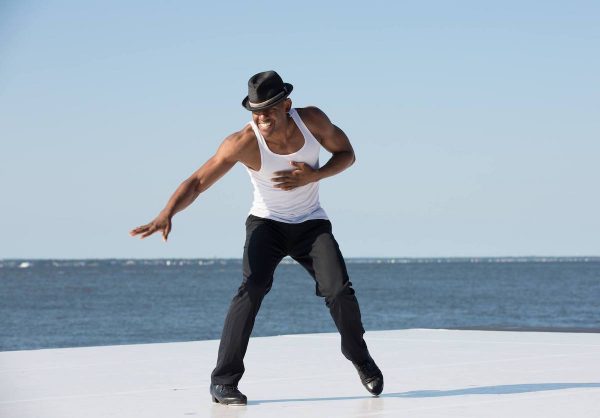
Q: What feeds tap’s longevity?
JG: I feel tap was first, born along jazz music and as music evolved to bebop, rock, disco so did the current commercial dance. Also tap has always lived alongside with music. It’s the closest link to what music is doing. Dancing to the music at the same time and creating its own music, using more senses. Usually you can be a musician or a dancer, but with tap you can be both at the same time.
Note: Watch Dulé Hill (Nat King Cole), Daniel J. Watts (Sammy Davis Jr.) and choreographer Jared Grimes tap dance in a facebook live feed: https://www.facebook.com/geffenplayhouse/videos/538924239923849/.
Lights Out: Nat “King” Cole at Geffen Playhouse, Gil Cates Theatre, 10886 Le Conte Ave., Westwood., thru Sun. March 17, Tues.-Fri., 8 p.m., Sat., 3 & 8 p.m., Sun., 2 & 7 p.m., $30-$155. http://geffenplayhouse.org.
